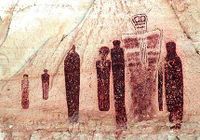Sego Canyon Cave Paintings: Difference between revisions
No edit summary |
No edit summary |
||
| Line 1: | Line 1: | ||
By Devon Washington | By Devon Washington | ||
[[File:Holy Man.jpg|200px|thumb|right]] | [[File:Holy Man.jpg|200px|thumb|right]] Figures are depicted surrounding an otherworldly Holy Man | ||
==Background== | |||
===History of Sego=== | |||
Sego Utah started off in the early 1890s as farmer Harry Ballard discovered coal on the lands next to his ranch. He then began purchasing this land to begin small scale coal mining operations that eventually rose to a small community named Ballard, after the owner. | |||
Ballard’s property was eventually bought out and the American Fuel Company began to develop the area in 1911 with plans for long-term coal production. Over time the company was plagued with water system problems, low profits, power supply issues and overall financial problems. At some points, there was no money to pay the miners, they were given scripts to spend at the company store. | |||
In 1949 a fire swept the site, drastically decreasing productions. Then when diesel engines mostly replaced coal powered steam engines the company came to a halt. After this, Sego became a ghost town. | |||
Revision as of 01:50, 11 November 2019
By Devon Washington

Figures are depicted surrounding an otherworldly Holy Man
Background
History of Sego
Sego Utah started off in the early 1890s as farmer Harry Ballard discovered coal on the lands next to his ranch. He then began purchasing this land to begin small scale coal mining operations that eventually rose to a small community named Ballard, after the owner. Ballard’s property was eventually bought out and the American Fuel Company began to develop the area in 1911 with plans for long-term coal production. Over time the company was plagued with water system problems, low profits, power supply issues and overall financial problems. At some points, there was no money to pay the miners, they were given scripts to spend at the company store. In 1949 a fire swept the site, drastically decreasing productions. Then when diesel engines mostly replaced coal powered steam engines the company came to a halt. After this, Sego became a ghost town.